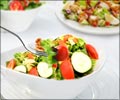Which?, a UK consumer watchdog, has found many salads on sale at leading stories a lot unhealthier than the fast food people are hooked on these days.
Salads do not seem to be a necessarily healthier alternative to the Big Mac hamburgers. Which?, a UK consumer watchdog, has found many salads on sale at leading stories a lot unhealthier than the fast food people are hooked on these days.
A Big Mac and medium fries will provide you with 820 calories and 40g of fat, but a prawn marie rose salad sold by a supermarket chain contained 855 calories and 66.3g of fat.The salad's fat level is 70 per cent of the recommended daily amount for a man. Eating too much fat can increase the likelihood of clogged arteries and heart disease, and has been shown to raise the risk of cancer.
Again while a Big Mac on its own contains 490 calories and 24g of fat, chicken caesar pasta salad bought by Which? had 683 calories, while the fat content was 41.3g. That is almost as much fat as seven Cadbury's Creme Eggs.
Mayonnaise or creamy sauces were often the reason many of the salads were so unhealthy, the watchdog said.
Around 80 per cent of mayonnaise is fat, while a tablespoon of it contains around 12g of fat and 110 calories.
The amount of mayonnaise dressing in a Marks & Spencer pasta with tomato & basil was second only to pasta in its list of ingredients.
Advertisement
Sainsbury's tomato & basil chicken salad was also comparatively high in fat, at 27.7g, and with 595 calories.
Advertisement
Which? editor Martyn Hocking said: 'If you thought your high street salad was healthy, you could be in for a surprise
'We found that there were large differences between the amount of fat, saturated fat, salt and calories in pre-packaged salads.
'This latest research backs up what we've been saying for ages - a clear, consistent labelling scheme is important to help people to spot how much fat, sugar and salt is in the food they're buying.'
The consumer group says its findings emphasise the need for clearer nutrition labelling on food packaging. Which? has previously highlighted the high fat and salt levels in ready-made sandwiches.
It said the lack of a standard 'traffic light' label system makes it difficult for consumers easily to see whether a product is high in fat, calories, sugar or salt.
Which? has also advised consumers to be wary of the same type of salad from different shops, with fat and calorie contents varying widely.
In response, most retailers insisted their salad packaging carried nutritional guidelines.
Source-Medindia
GPL














